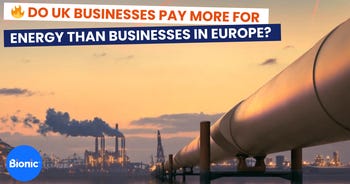How your business can benefit from an Energy Performance Contract
Running your business can be hard, especially when you’re contending with obstacles like the cost-of-living and energy crisis. But did you know there is a way to improve the energy efficiency of your business with the help of an energy service company? Putting an Energy Performance Contract (EPC) in place could potentially save you money on your bills, lower energy consumption and improve sustainability.
Read this guide to find out more and be well on your way to becoming a greener business.

30 Second Summary:
- Energy Performance Contracts (EPCs) are contracts between businesses and energy service companies to improve energy performance and lower consumption, potentially saving money in the process.
- EPCs are different from Energy Performance Certificates (EPCs), which assess building energy efficiency but offer no guarantees.
- Energy Service Companies (ESCOs) provide the EPCs and offer various energy solutions and project implementation.
- EPC benefits include cost reduction, energy efficiency, safety improvements, contribution to environmental targets, and better business reputation. They can also help achieve government targets for net-zero emissions.
- Common EPC types include shared savings, guaranteed savings, and chauffage.
What is an energy performance contract (EPC)?
An Energy Performance Contract (EPC) is a contract between a business and an energy service provider. It aims to improve energy performance and lower consumption and is a common way businesses can reduce their carbon footprint. By signing an Energy Performance Contract, a business is guaranteed specific improvements to be made to help them meet a certain standard.
Energy Performance Contracts are a low risk way of improving the green status of your business. And if the improvements are not made, then the energy service provider still has to compensate or make these changes under contract.
What is the difference between an Energy Performance Contract and a Energy Performance Certificate?
Because they sound quite similar, it can be easy to confuse an Energy Performance Contract with an Energy Performance Certificate.
An Energy Performance Certificate is a document that breaks down a building's energy efficiency and gives it a rating. The ratings are scored on a scale of A-G and the certificate is a legal requirement all non domestic buildings under construction or up for sale or rent. A is considered the most efficient, and G the least. An EPC rating considers how much energy a building uses based on insulation, heating system, lighting and hot water. It also gives recommendations on how to improve the rating, lower energy consumption and an estimation on how much money could save on current energy bills.
With a energy performance certificate recommendations are only supplied, there are no guarantees of them being made.
On the other hand, an Energy Performance Contract is a signed contract between an organisation and an energy service company (ESO) that guarantees the energy saving improvements outlined in the contract. And if a business can't make energy savings outlined, it's in the hands of the ESO who has to guarantee the level of savings the various measures are carried out.
What is an ESCO?
An ESCO is an Energy Service Company or Energy Savings Company and they’re the companies that give you your Energy Performance Certificate.
An ESCO will usually offer a variety of energy solutions, help implement energy savings projects within your business and deal with energy conservation, outsourcing energy infrastructure and risk management.
The EPC contract is struck up between you –- the client –- and an ESCO. Any energy upgrades are funded through cost reductions. The income from the cost savings or any renewable energy produced is then used to pay the costs of the project.
Responsibility for covering the cost of any initial energy-saving investments is down to the ESCO. The investments may include things like installing energy-saving appliances (like solar panels or double glazing) or making the most of efficiency schemes.
What are the benefits of an Energy Performance Contract?
There are a few key benefits of an Energy Performance Contract.
Reduces business energy costs
Although it may seem like just another thing to add to your business to-do list, investing in energy-efficient measures now could save you money in the future. EPCs are designed to reduce your energy levels by renewing improving the way your business uses energy. Once these changes are made, you'll likely see savings continue into the future.
Minimises energy consumption
An EPC will improve the sustainability of your SME and minimise your energy consumption by focusing on improving building performance in areas like lighting, heating, cooling, ventilation and water supply.
Creates a safer working environment
Because an EPC looks at physical changes to make within your business, it can help create a safer working environment. Using old equipment and appliances not only drains your energy and costs you more money in the long run, but it can also be dangerous for your staff and customers.
An EPC can give you peace of mind that your business is being as efficient and safe as possible, creating a safer work environment for you and your staff.
Helps contribute towards government energy targets
Being environmentally friendly is top on many SMEs lists right now, in fact achieving net zero is high on the UK’s priority list, with measures being put in place to get there by 2050.
Having a green business is now more beneficial than ever. It can improve your reputation and attract more customers who share the same environmental beliefs as you. Plus, by reducing your impact on the planet, you’re doing your bit to help the global emergency. An EPC will also go a long way in helping reduce the price of gas and electricity bills in the future, so it’s a good thing to put it in place sooner rather than later.
Improves business reputation
It’s not just about saving money and boosting your green business rating though. EPCs represent your businesses' commitment to sustainability and will likely improve your business reputation. You'll be demonstrating social responsibility and showing you care about your own carbon footprint.
What targets can EPCs help work towards?
There are government proposals which hope to achieve net zero by 2050 and decrease emissions by 100% compared to 1990 levels by this time. Businesses setting up Energy Performance Contracts can help towards this target because they'll be using less energy and using it more efficiently.
What types of EPCs are available for businesses?
The two most common types of EPCs are shared savings and guaranteed savings. However, there is also a third option called chauffage.
- Shared shavings - With this option, the ESCO can provide financing, as well as project development and implementation costs. The energy savings are then shared between the ESCO and the client over the period of the contract.
- Guaranteed savings - The ESCO guarantees a certain amount of savings on the client’s energy bill. The ESCO takes on the risk while the client takes out a bank loan or uses equity to pay the fees to the ESCO and the bank but keeps the difference.
- Chauffage - The ESCO takes on the responsibility for providing the agreed level of energy service, but it has to be lower than the client’s current bill. The more efficiently and cheaply the ESCO can do this, the more it will earn.
How does an EPC work?
An Energy Performance Contract works when your energy service provider agrees to take responsibility for making changes to lower your emissions. It is a kind of creative financing, the cost of the changes made to your business is usually funded by the money you save from making these changes in the first place.
How can Bionic help my business?
No matter the size of your business, an EPC could help you lower your bills and use less energy.
If you need more help understanding business energy, head over to our energy guide pages for more information. Or, get in touch today with the Bionic team to discuss your business energy needs, including electricity and gas.








